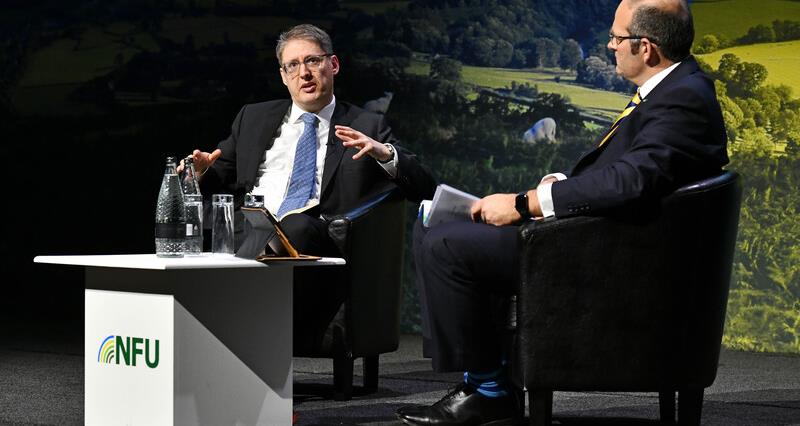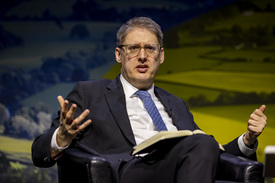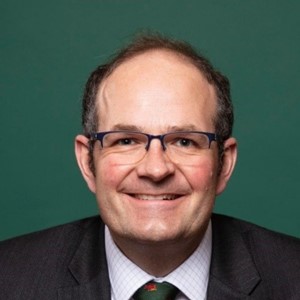Headwinds of the economic crisis will be buffeting farming businesses for some time to come, CBI Director General Tony Danker told NFU Deputy President Tom Bradshaw during the business session on day one of conference.
Mr Danker said that although industry was warning of looming difficulties in 2021, government and the Bank of England had not appreciated the threats that rising input costs, wage inflation caused by labour shortages and soaring energy bills would have.
He cautioned that although the UK had been ‘lucky’ this winter as mild weather had helped to keep energy costs lower, he was already worrying about the impact of next winter as there would be a long tail of rising prices as inflation passed through the food chain. The possibility of renewed turmoil in Ukraine could also create further problems.
Reducing inflation, boosting the economy
He praised the national response to the economic crisis, saying that the Bank of England’s focus on interest rates and the government’s determination not to fuel inflation were the correct measures – although it would take a year to get the economy in a better place and in the meantime the government faced the challenge of reducing inflation and stimulating the economy at the same time.
Although the government wanted to reduce dependence on financial assistance for industry, Mr Danker added that it was still advisable to use it to help smaller firms build up energy efficiency and resilience, and that firms needed a fully-functioning supply chain before they could be fully weaned off support.
Importance of food security
“We need to find ways for the government to either incentivise growth or to unlock the barriers to growth that we, as businesses, face every day. They can’t say no to both.”
Tony Danker, Director General, CBI
He said that the crisis had highlighted the importance of domestic food security and the resilience of our supply chain, and that our business strategy needed to shift away from the relentless focus upon imports.
Mr Danker warned that proposed tax rises in the budget could harm business investment and that the issues of deregulation, planning and immigration were creating uncertainty for firms. However, a drive to promote investment and create a net zero growth strategy could have major benefits, and the resulting growth could be bigger than financial services for the UK in the future.
Finding ways to incentivise growth
“UK Plc is a coiled spring ready to leap,” Mr Danker said. “But we need to find ways for the government to either incentivise growth or to unlock the barriers to growth that we, as businesses, face every day. They can’t say no to both.”
Mr Bradshaw said that the looking after the rural economy was a vital part of that, and that rural energy hubs could help to transform the rural economy.
Mr Danker agreed, saying that Rishi Sunak was a Prime Minister who was personally obsessed with innovation, and that industry needed to capitalise on his interest and help to steer the innovation agenda – although it was important to push back on suggestions that automation offered the solutions to workforce difficulties as the technological solution was always five-to-ten years away.
In the meantime, firms had to recognise that flexible working post-pandemic had changed the workplace forever, he said, and employers competing for talent had to realise that this was a generational shift that was now looking permanent.
Key to success
He said that the key to success would be for the government to agree to a new deal on immigration – to consider what skills we needed and whether they were currently available. If not, we need to solve the immediate problem of immigration, and then upskill our own students through the school system.
Mr Danker offered words of advice on influencing government policy, warning that you could not avoid politics and going ‘against the political grain’ was futile. The key to success was understanding priorities, such as achieving net zero cheaply, increasing global trade and developing skills.
Opposition to the Australian and New Zealand trade deals had failed because that was against the grain of the government’s priorities, whereas work on temporary immigration visas had been successful as it had tackled a clear problem for ministers – and agriculture remained the only industry in the UK with a special immigration policy.
Meet the speakers from this session
Tom Bradshaw
NFU President
The home farm is based around arable production but has also diversified into equestrian and renewables.
Tom has represented the NFU from Local Branch Chairman through to Chair of the National Combinable Crops Board.
Tom was elected to the position of NFU President in February 2024.
Responsibilities
- Animal health and welfare incl. bTB
- Trade and standards
- Climate, energy and net zero
- Food supply chain (fair dealing, mergers and acquisitions, competition, regulation)
- Animal ID and movements
- Assurance review
- Taxation and fiscal policy
- Immigration


